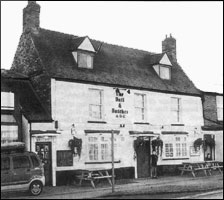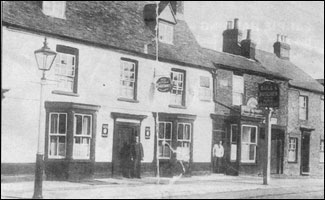![]()
The contents on this page remain on our website for informational purposes only.
Content on this page will not be reviewed or updated.
 |
|
 |
|
|
||||
|
Commercial Life 1891
|
||||
|
||||
|
Sunday Citizen January 20, 2002
Pursuing our ongoing theme of historical voyeurism, this week we drop in on the year 1891 and find out what the traders of Fenny Strafford were getting up to. Strengthening the ties of trade and in a nifty business manoeuvre Mr Blunt the butcher, of Fenny Market Place, married off his daughter to Mr Smith the grocer and ensured himself a lifetime's supply of meat and two veg. Something else to be chewed over were the many bargains at The Peoples Hatter; of London House where - with Tweed suits at 12s lid - Mr James Berwick vied to clothe the entire population by his talents as a hosier, glover, clothier and supplier of boots and shoes - in competition with his cheaper rival down the road, The Fenny Stratford Cheap Drapery and Clothing Stores'. Elsewhere in the town there was discord in the ashpits and ' closets department, the emptying of which had proved to literally be a one-horse operation. It was widely held that if the present operator had at least two, then the work would have been fairly satisfactory but it was too late. The stable door had been firmly bolted and both he and his horse were put out to grass. Unbeknown to most, the horse-drawn age was now slowly plodding into the sunset but one with an inkling of what the future might hold was Mr Stuart at the Bletchley Iron Works.Together with Mr Binney, he had recently been granted a patent for a design of gas engine and suitably encouraged went on to patent several other 'Motor and Rotary Engines'. Whilst gas engines may have been in their infancy, the gas industry - especially at Fenny Strat-ford - was not only fully fledged but also expanding in all directions with a bigger and better works and a bigger and better gas holder. Sift 6ins in diameter. The reason for this welcome prosperity had been the rapid growth of the town and with trade increasingly vibrant, 'For the purpose of considering a Proposal to Form a Local Trades' Association for Criminal Prosecutions and the Collection of Trade and other Debts', a public meeting to consider this matter was held at The Swan. Perhaps with Mr Cheshire, 'Pastry Cook and Confectioner', supplying the nibbles from his Fenny Stratford Refreshment House, in High Street, amongst those assembled may well have included Mr Holdom, the brewer, the Rowlands Brothers at their 'steam saw mills', Mr T Read at his brick works, Mr Cook, the brush manufacturer and perhaps a representative from the Bucks Post Office in Aylesbury Street. For those involved in water-borne trade, however, it was not such plain sailing. Mr C Johns, canal carrier at Navigation Wharf managed to keep afloat but William Clarke, with wharves at Fenny Stratford, Simpson and Water Eaton was sinking fast and in fact by the direction of the Offi¬cial Receiver the sale had to be made of 'the entire stock in trade and plant of a coal and builders merchant and wharfinger', including 30,000 bricks, an Avery's coal machine, two timber carriages and an 8hp engine by Clayton, Shuttleworth and Co. Also included were three canal boats, four horses and the Valu¬able Contents of the Residence; not to mention 'an Acre of Mangold Wurtzels, at Water Eaton. Troubled waters indeed but at least the Mangold Wurtzels might have found a ready market with the labourers of Fenny, who had just been given a field in Denbigh Road by Sir Herbert Leon. This, for their benefit, would be subdivided into allotments at a low cost rent and as we close our look at the year, we therefore find the labourers and Mr Leon's farm bailiff in amicable negotiations at the Bull and Butcher, discussing the appointment of trustees and the election of a regulating committee. |
||||
|
|
||||
|
|
||||


